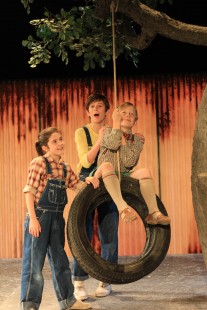‘Slight twist on the classic’
This production of To Kill A Mocking Bird, from London’s award-winning Regent’s Park Theatre, is a slight twist on the classic which still manages to keep true to the core of Harper Lee’s original novel. Each cast member strolls on stage with a copy of Harper Lee’s novel and starts to narrate, each taking part of the role of the protagonist character Scout, a device which is used throughout. Each uses their natural accent, emphasising the international success and relevance of this important story.

The set is a wonderful, DIY spectacle as the streets of Maycomb are literally painted out in front of us; the symbolic tree is there – constant and realistic – throughout the entire show. The costumes, while for the most part portraying southern fashion of the 1930s clearly, have several subtle but significant issues of authenticity. But it could, like the array of British accents that carry the story, have been deliberate, the hoodies and drainpipe jeans a nod to the longevity of this story and the idea that it still has reason to be retold today.
While we no longer live in a world of racial lynching and unmistakeable bigoted miscarriages of justice, are we really as removed from it as we like to think?
We are indirectly asked this question during the key trial scene. Here the audience becomes the jury and we are brought into the intense courtroom scene with the sense of being asked to judge for ourselves if the gentle Tom, a black man has raped the white girl, Mayella.
With a nod to the evocative song of a mocking bird, this performance is sprinkled with wonderful sounds from the subtle tap of the court reporters typewriter to the towns busker who wonders the streets, guitar in hand, pulling us deeper into the American south with his folk and country melodies.
The southern state accent, being a very easy one to turn gimmicky, is for the most part played to perfection with good distinctions between linguistic differences caused by class and race. The charming twangs and drawls were particularly well done by the three children, who are key to this famous story.
With the actors slipping seamlessly from their role as modern reader to old-timey guy or gal and the set creating the dry heat of Alabama as the stage lighting changes with the hour and season, the scene setting live music, and the constant reminder of the significance this book has, it is clear this performance was put together with thought and genuine respect for this much loved classic.
Mairi Smith
‘Transported the audience to a different time’
The well-known and much loved novel by Harper Lee, adapted to the stage by Christopher Sergel and directed by Timothy Sheader is brought to life in the hands of an engaging and charismatic cast.
In 1930s Deep South America, when six-year-old Scout’s father defends a black man against a white woman’s false accusations of rape, her understanding of both the insular town in which she lives, and of herself, are challenged and changed.
While the soundscape of chirping birds and crickets effectively transported the audience to a different time and place, the music was a disappointment, with the acoustic guitar failing to add much to the atmosphere of the production.
Additionally, miscalculated timings in a few of the significant scenes, for example the trial, diluted their intensity leaving the audience wanting in terms of extent of emotional captivation.
Nevertheless, the on-stage changing of actors into their minimal costumes when combined with the simplicity of the set conveyed a sense of child’s play which affectionately reminded the audience that Scout is after all only a young child trying to make sense of the complexities of a very adult world.
All in all this production of To Kill A Mockingbird does justice to and reignites the admiration of Lee’s compelling novel.
Una McBurney
‘A historical signifier of injustice’
In amongst a contemporary setting of race and gender issues, To Kill a Mockingbird acts as historical signifier of injustice.
Cleverly portrayed through the eyes of Scout, the play re-in acts the innocence of a child’s eyes. Through the act of dressing up, the performers draw you into their own world and produce a true depiction or Harper Lee’s classic.
It also uses a Brechtian dramaturgical style that induces political involvement in the audience.
Although strong in this respect, the work tended to drag on during the serious scenes – with the grown-up actors over-emphasising their points and at times their accents.
Yet overall the effect of the production was positive and it allowed a transcendence from a cold, rainy Glasgow to the Deep South of the thirties.
Leyla Bumbra
To Kill a Mockingbird, adapted for stage by Christopher Sergel, based on the novel by Harper Lee.
Now showing in Aberdeen: 16– 21, February (Edinburgh and Glasgow dates
have now passed)
www.tokillamockingbirdplay.com



